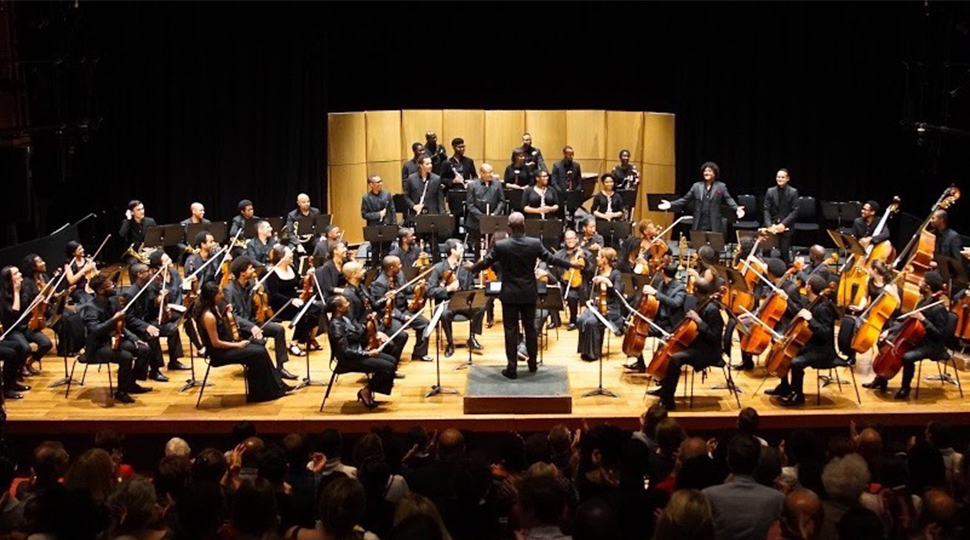For as long as I have worked in the music sector in the UK, and probably long before that, the topic of diversity and inclusion in Classical Music (or the lack of it) has been on the agenda. No-one has ever argued against the fact that something is not right if the make-up of the people sitting on stage does not reflect the society we live in. Why we have been unable to achieve a professional workforce which reflects society, and how to do something about it, has been harder to explain and achieve but now, across the sector, the need to really address the diversity issue is rising up the agenda with an urgency I’ve not seen before.
London Music Masters has been working single-mindedly to redress the lack of diversity in classical music since Victoria Robey OBE, founded the organisation in 2007 to create opportunities for youngsters who are marginalised, be that for reasons of finance, class or ethnicity. Its work continues today under the inspiring leadership of Rob Adediran, who has his own story to tell.
Last September, Chineke!, Britain’s first orchestra made up of black and minority ethnic musicians drawn from across Europe, gave its first concert at the Royal Festival Hall to great acclaim. It was an inspiring evening which really bodes well for the future. Founded by double-bass player, educator and broadcaster ChiChi Nwanoku MBE, FRAM, herself of Nigerian descent, the aim of Chineke! is to pave the way into professional music life for a section of society which is currently almost unrepresented.
A couple of weeks ago I attended a Global Symposium on this subject, presented by Sphinx Organization from Detroit, in partnership with Chineke! Foundation, London Music Masters, Sistema Europe and Southbank Centre. Founded by Aaron Dworkin, who was awarded Honorary Membership of the UK’s Royal Philharmonic Society in 2013, Sphinx Organisation celebrates its 20th anniversary next year – 20 years of creating opportunities in classical music for young people of colour. Recently appointed Dean of Arts School at Michigan University, Aaron opened the day with a thoughtful, thought-provoking and galvanising keynote address. He talked about his own journey, about the power of institutions to make or break youngsters, how he aimed to build inclusion as opposed to practising affirmative action, about being relevant to his art and to his community. All must be heard, and all must be understood, he said. All of these things resonated. As did his statement that talent is democratic, opportunity is not. So what we really need to ensure is that we, as a society, are making opportunities for everybody in society to become excellent. In classical music, this means ensuring those opportunities start very young, ensuring that week-in week-out there is music making available at grass roots level in primary schools and upwards throughout the country, to ensure an inclusive pipeline. It’s the first time I’ve heard this so forcefully articulated and it was so good to hear.
The conclusions that were teased out by Marshall Marcus, CEO of the European Union Youth Orchestra, and Chairman of Sistema England, included the call to learn from others, to look at new models, to ensure the stage is a mirror of society. And he articulated a question that had been going through my mind all day: what is excellence? Have we sacrificed character and passion on the altar of technical excellence? A contentious issue but one that it is time we explored.
The issue of diversity and inclusion is set to run and run, and not only in the classical music sector. In July, UK Music Diversity Taskforce launched a music industry workforce diversity survey – the first of its kind. “The economic and cultural success of British music over the last couple of years has been astronomical,” said Jo Dipple, CEO of UK Music. “For us to continue such success we need a strong entry-point pipeline of diverse talent as well as career progression and a diverse management at the top.” Elsewhere, applications are open now for Radio 3’s industry conference, exploring greater diversity across classical music composers.
Increasingly, it’s not tick-box political correctness that is steering the argument around lack of diversity but issues of artistic quality and richness and a realisation that the lack of diversity is depriving audiences of a better listening experience. Minority groups are such a vital part of our society; it’s high time that they were also a vital part of our orchestras too.
– Cathy Graham


